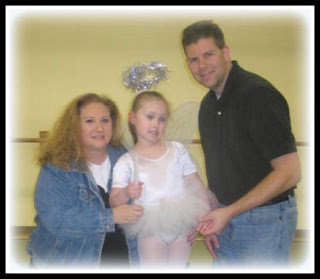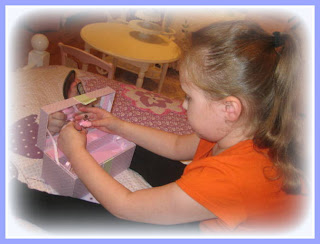Let's face it. Not many people like the word "obey".
Anytime I use that word around Kylie's therapists ("Kylie you need to obey Miss Therapist"), they quickly change the wording to "Yes, Kylie, please
follow directions"
People don't like the word
obey because it implies submission and so many of us have a problem with authority. We want to be THE BOSS.
I get it, I truly do.
(
I, also, have a
slight issue with authority - we creative types
always do)
Even though I don't particularly LIKE the word "obey", I still use it. I use it because Jesus used it and Jesus never did anything without a reason.
My daughter at age 6 (and on the Autism Spectrum) knows the meaning and definition of the word "obey". We have placed it before her since she was tiny.
Did you notice what I just wrote? I used the phrasing "
placed it before her" rather than "
drilled it into her" for a reason.
You see, as a person who would rather be my own boss, I realize the importance of
strategy and
diplomacy. There is a way to get our children to obey without always placing a figurative yoke around their neck and dragging them to the task at hand.
The thing is, Kids are people pleasers. They WANT to make you happy, but they want to do it in their own time and in their own creative way. Sometimes, this poses a problem when REAL life enters the picture.
Kids don't understand that things in the adult world happen on a schedule. That some schedules are flexible and can change, but that other schedules absolutely cannot be changed.
Charlotte Mason, a great educator from the past, once referred to the fact that obedience needs to be a HABIT and that out of everything you can teach a child, obedience is the "single greatest pattern to be formed" (
For the Children's Sake by Susan Schaeffer Macaulay)
If for no other reason, our children need to know how to obey for safety reasons. Let's say they are running toward a rolling ball that has left the playground and ventured into the parking lot. If we shout "stop!" and they don't obey, their very life could depend on it.
Many children and especially children who experience special needs have very valid reasons for not obeying. These reasons vary from they simply
don't respect the elder giving the directive to they didn't
hear the directive.
If a child does not respect you enough to obey you, you might want to take a look at your personal character:
*Are you trustworthy? (or do you make promises that you don't keep?)
*Do you behave like an adult? (or do you throw loud and uncontrolled temper tantrums?)
*Do you control your emotions? (or do you use emotions in an attempt to manipulate your child?)
*Do you follow through? (When the sticker chart is full do you implement the reward? When the chore is completed, do you pay the allowance?)
*Do you practice what you preach? (or do you violate your own directives?)
These are just a few of the things that may cause your child to disrespect you. If you are guilty in one or more area, apologize to yourself and then to your child and let them know you are going to be a better parent. THAT will be a great first step toward reconciliation and restoration of the relationship.
Many children have issues with obedience due to auditory processing, maintaining focus, having control over their own body systems, the ability to respond quickly or on demand, hearing, attention, hyperactivity and the list goes on.
These things are very important to know and recognize in any child.
Once you know about your child's abilities and have repaired your own character, you are ready to initiate obedience training. Obedience is a skill that needs to be
modeled,
taught and
practiced.
No one likes to be TOLD what to do. But we all like to be offered choices; It gives us the illusion of being in control.
(offering choices works like magic in our own home: "Kylie, which would you like to pick up first? the markers or the crayons?" or "Kylie, you may either pick up your toys and watch a movie afterwards or you may leave the toys out and head to bed now." and it seriously becomes
her choice.)
Modeling Obedience
The best place to model obedience is in the car. The law of the land has posted signs that must be obeyed: speed limit signs, yield signs, stop signs, crosswalks, etc. Your children know if you are obedient and respectful toward the law. If you don't obey those in authority over
you, why should it matter for
them to obey
you?
Teaching Obedience
The basic formula of obedience is
(O) + DR = Blessing
Obedience plus
doing right equals
blessing.
This formula is based on Ephesians 6:1-3
"Children obey your parents in the Lord, for this is right.
"Honor your father and mother"- which is the first commandment with a promise attached to it- "that it may go well with you and that you may enjoy long life on earth."
I recently saw
this illustration that beautifully teaches the obedience/following directions concept on a child's level.
It is basically a key ring concept. The key ring has a tag with the Ephesians 6:1-3 verses typed out on it and on the key ring is 4 laminated paper keys teaching
what obedience is:
1.) Obey: Immediately
2.) Obey: Cheerfully
3.) Obey: Completely
4.) Obey: Without complaining
If a child obeys, but is grumpy about it, you simply point out that they are missing a key and suggest that they find it and use it to unlock the blessing. These small tangible reminders help to reinforce exactly what obedience is.
 |
| This is a photo of the version I made for Kylie. |
Practicing Obedience:
Obedience is comprised of
Listening/Processing and
Following Directions.
When caregivers say to my child "Kylie you need to listen" - It drives me C-R-A-Z-Y. Kylie has auditory processing issues. She HAS listened. The time lapse in response is due to her brain trying to process the information so she
can act.
Some children (a LOT of children) require object cues, picture cues, sign language cues, lists or other to help them understand what it is that you are asking of them. (otherwise your directive sounds like that of Charlie Brown's teacher "wah, wah, wah, wah, wah, wah" - no child has a chance at following that direction)
If it is time for Kylie to pick up toys, we don't generalize and say "Kylie you need to pick up toys" instead, we use a white board and we write on it.
1.) Pick up markers
2.) Pick up Barbies
3.) Pick up coloring books
until everything has been picked up
Or , we will use a "First/Then" method. "Kylie, First pick up Barbies, Then eat popsicle"
both allow her some flexibility in making the decision for herself, but both also accomplish the task needing to be completed.
It is also important to give your child the tools and scenarios to be successful. Do not set them up for failure by keeping them up too late at night and demanding obedience when they are too tired to respond appropriately. Don't attempt a clean up routine when lunch has been delayed by an hour. All they can think of is how hungry they are. They are in no mindset to be obedient.
Make sure your child's needs are met
first and
then work on practicing obedience together.
Easy Ways to Practice Obedience This Fall Season:
*
Follow directions according to a recipe for food or for playdough. If the recipe is not followed correctly the item does not turn out as it should. Here is
my recipe for Pumpkin Pie scented playdough
*Do an activity together that encourages
following a pattern. Here is a
pumpkin nailing activity that we did with Kylie.
*Play a game with
2 step directions. Here is
a Game that we play with Kylie that not only focuses on following directions, but also on counting and sensory integration.
* Work on
boundaries: We do this by creating seasonal sensory bins for Kylie to play in. We put a large sheet under the sensory bin and the rule is that the items in the sensory bin HAVE to stay within the boundary of the sheet. If they end up on the carpet or in another room, we have to put away the sensory bin for a time. Here is our
Halloween bin,
Our Icky Sticky bin, and our
November/Thanksgiving bin.
Anne Sullivan (Hellen Keller's teacher) once said...
"I have thought about it a great deal, and the more I think, the more certain I am that obedience is the gateway through which knowledge, yes, and love, too, enter the mind of the child."
























































